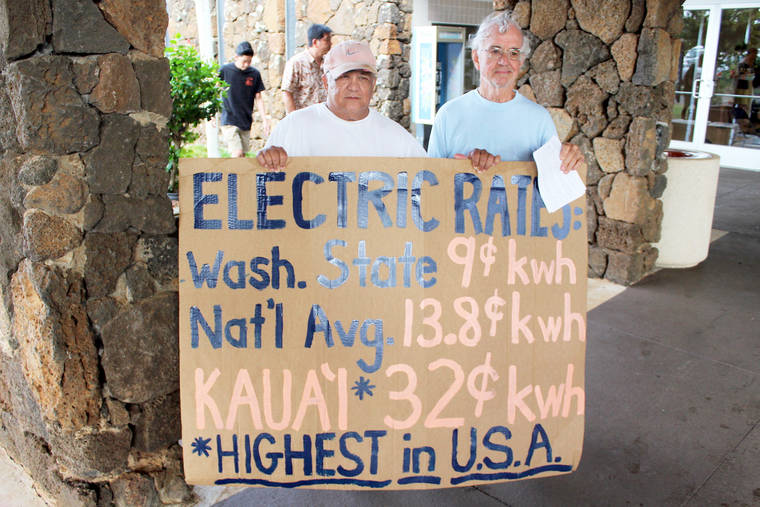LIHUE — Board members of Kauai Island Utility Cooperative sat before about 250 people at their 17th annual members meeting at the Kauai War Memorial Convention Hall Wednesday evening.
The board shared the cooperative’s vision and goals as well as where they are today, answering questions about the recent blackout, a water-diversion plan, a new solar-plus-storage plant and how they are going to attain their goal of reaching 70% renewable energy production by 2030.
The cooperative reported total revenue of $162.6 million with expenditures of $154.2 million for a profit margin of $8.4 million for the 12-month period ending on Dec. 31. It also reported a 99.979% reliability rate in 2018 with an average outage time per customer of 1.83 hours for the year, the lowest in the state.
“We have a second project with AES (corporation), which is under construction at PMRF,” board Vice-Chair Jan TenBruggencate said. “It’s another solar-plus-storage plant like the one we just completed in Lawai. This project will provide the island with about 7% more renewable energy when it’s completed in 2020.”
TenBruggencate added that the project would allow the base to be “islanded,” or separated from KIUC’s power grid, allowing for solo operation off the solar batteries in case of grid disruption, or if they are “conducting certain operations.”
“Otherwise all energy produced will go into KIUC’s grid and serve the entire island,” he said. “Once this project is completed in mid-2020, we’ll be able to generate roughly 65% of our peak evening energy needs from stored solar.”
KIUC will add another 15% of renewable energy to its grid that currently has 55.5% renewable energy as of this month, which increased from 43.5% the previous year.
KIUC is moving forward with development of the Westside renewable-energy project that will use photovoltaics, hydropower and pump storage to generate another 15% renewable energy for the island, TenBruggencate said.
The project will provide water for agriculture for the Kekaha Agriculture Association and will provide water and electrical service to the state Department of Hawaiian Home Lands parcels above Kekaha, which will open up significant land for new agricultural homesteads, he said.
Many members thanked KUIC during the public testimony portion of the meeting.
“I’ve only lived here since 2002, so I have only known you folks as our utility provider,” said Sarah Stein from Hanapepe. “But probably around 10 years ago I had the opportunity to attend a field trip that was put on by you folks and the Kauai Economic Opportunity board. I’m definitely someone who took for granted what a utility does for us.”
Mark Perriello, president of the Kauai Chamber of Commerce, said, “I think the work that you guys are doing, you men and women, is tremendous. On behalf of the island and our residents, I want to thank you specifically for the work that you did recently with the power outages. You got things up and running as quickly as possible.”
Others had a little more sharp criticism for the board.
“I’m here this evening to voice my concerns as a union about what is going on with the solar fields and the hydro generators,” said Richard Jose with the electricians union IBEW (International Brotherhood of Electrical Workers). “My concern is why we are losing so much of this work for local guys.”
“Our local contractors are more than capable of doing this work,” he said. “Yes, we get contracted to do the small portions of the solar farms, but the majority of the work is done by the mainland contractors.”
Outside the entrance to the convention hall, Kip Goodwin and Raymond Catania held signs proclaiming that Kauai has the highest electric rates in the nation.
They handed out copies of a handwritten note, saying, “The Bureau (Board) of Land and Natural Resources must deny KIUC’s permit application (65-year lease) to divert public’s water,” amongst other things. The title of the flier reads, “Why are rates so high?”
KIUC said rates have stabilized, and that trend is expected to continue.
“KIUC has not had a rate increase since 2009, and does not anticipate filing for a rate increase in the near future,” according to a press release
KIUC’s residential rates have averaged between 34 and 35 cents per kilowatt hour since 2015, down from 44 cents per kilowatt hour as recently as 2014.
Formed in 2002 and governed by a nine-member, elected board of directors, KIUC is a member-owned cooperative serving 33,000 customer accounts on Kauai.
“We appreciate our members coming out to the annual meeting, giving us a chance to have a productive dialogue,” said board Chair Allan Smith. “KIUC’s board members are elected by our member-owners, and we take that accountability very seriously.”



